Community of Democracies
Community of Democracies |
||||
|---|---|---|---|---|
|
||||
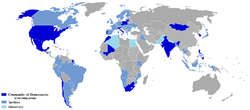 Member states of the CoD
|
||||
| Type | Intergovernmental coalition of states | |||
| Members of the Governing Council | List
|
|||
| Leaders | ||||
| • | President of the Community | United States | ||
| Establishment | 2000 | |||
| Website community-democracies.org |
||||
The Community of Democracies (CD) is an intergovernmental coalition of states established in 2000 to bring together governments, civil society and the private sector in the pursuit of the common goal of supporting democratic rules and strengthening democratic norms and institutions around the world. In 2004, CD governments also organized themselves into a Democracy Caucus in the United Nations (UN).
The current Presidency of the Community of Democracies is held by the United States.
Purpose and structure
The Community of Democracies works to support democratic transition and consolidation worldwide and helps bridge the gap between principles of democracy and universal human rights and practice by:
- assisting societies in the development and strengthening of democratic institutions and values;
- identifying, alerting and responding to threats to democracy so as to assist states to remain on the path to democracy;
- supporting and defending civil society in all countries;
- advancing broad-based participation in democratic governance; and
- giving a voice to those working peacefully for democracy in all countries.
The Community of Democracies seeks to achieve these goals by: creating a global network of government representatives, legislators, civil society and other stakeholders committed to these goals, and using their combined resources and expertise to channel assistance to countries in transition and civil society. The CD also assists in coordinating democracy support activities and seeks to encourage a common democratic voice in international organizations.
Every two years, participating states of the Community of Democracies hold a Ministerial Conference, the biggest meeting of democratic countries in the world. Criteria for participation in the Community's Ministerial Conference were constituted according to the values of the Warsaw Declaration, and participation in the Conference is reserved for countries that have shown commitment to those values and practices. Some countries, which do not fully fulfill the criteria, may participate as observers.
The CD was reformed in 2011 at the Ministerial Conference in Vilnius. The reform package included the establishment of a Governing Council, made up of the members of the previous governing body, the Convening Group. Being the core decision-making body of the Community of Democracies, the Governing Council is responsible for the activities undertaken on behalf of the Community. It also decides who will be the countries taking part in the Ministerial Conferences. The Governing Council currently consists of 27 members:
Members of CD Governing Council
-
 Argentina
Argentina -
 Canada
Canada -
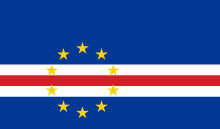 Cape Verde
Cape Verde -
 Chile
Chile -
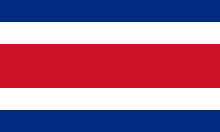 Costa Rica
Costa Rica -
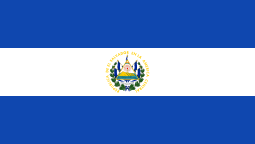 El Salvador
El Salvador -
 Estonia
Estonia -
 Finland
Finland -
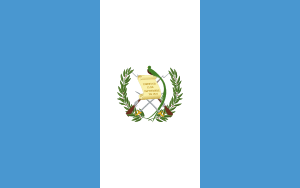 Guatemala
Guatemala -
 Hungary
Hungary -
 India
India -
 Italy
Italy -
 Japan
Japan -
 Lithuania
Lithuania -
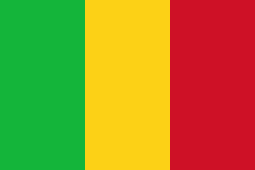 Mali
Mali -
 Mexico
Mexico -
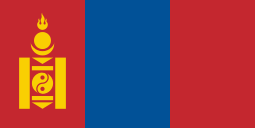 Mongolia
Mongolia -
 Morocco
Morocco -
 Nigeria
Nigeria -
 Norway
Norway -
 Philippines
Philippines -
 Poland
Poland -
 Portugal
Portugal -
 Republic of Korea
Republic of Korea -
 Romania
Romania -
 South Africa
South Africa -
 Sweden
Sweden -
 United States
United States -
 Uruguay
Uruguay
Leading the work of the Governing Council is the Presidency of the Community, a role that rotates between the different Member States of the Council, passing from continent to continent every two years. After the post was held twice by Asian countries (the Republic of Korea and Mongolia), twice by European countries (Portugal and Lithuania), once by a country in the Americas (Chile) and once by and African country (Mali), the Presidency is now back to Latin America, being held by El Salvador, and will afterwards move to Africa, when Nigeria will hold the post from 2015. To assist the Presidency in its work, was established an Executive Committee, an advisory board whose responsibilities are to support the Presidency and make recommendations regarding the activities of the Community. The Executive Committee is composed of the current Presidency, together with the former and the following Presidencies (at the moment- Mongolia and Nigeria), and with Poland, the United States and Sweden.
Since 2009, a Permanent Secretariat of the Community of Democracies operates in Warsaw, providing technical, logistical, organisational and administrative support to all the bodies of the Community. A satellite office was opened in Geneva in October, 2015.
History
The CD was inaugurated at its first biennial ministerial conference hosted by the government of Poland in Warsaw on June 25–June 27, 2000. The initiative was spearheaded by Polish Foreign Minister Bronisław Geremek and U.S. Secretary of State Madeleine Albright, along with six co-conveners: the governments of Chile, the Czech Republic, India, Mali, Portugal and the Republic of Korea.
At the close of the conference the participating governments signed onto the Warsaw Declaration, agreeing “to respect and uphold…core democratic principles and practices” including, among others, free and fair elections, freedom of speech and expression, equal access to education, rule of law, and freedom of peaceful assembly.[1]
In closing remarks to the ministerial conference in Warsaw, the UN Secretary General Kofi Annan praised the Community of Democracies as a positive development toward global democracy, saying. “When the United Nations can truly call itself a community of democracies, the Charter's noble ideals of protecting human rights and promoting "social progress in larger freedoms" will have been brought much closer."[2]
Since the original conference in Warsaw, the chairmanship of the Community has been rotating. Ministerial Conferences were held towards the end of each presidency term in the capital of the presiding state, resulting in the adoption of a common declaration / plan of action towards the following activities of the Community: Seoul 2002 (South Korea), Santiago 2005 (Chile), Bamako 2007 (Mali), Lisbon 2009 (Portugal), Vilnius 2011 (Lithuania) and Ulaanbaatar 2013 (Mongolia). A special High Level Democracy Meeting was held as well in 2010 in Krakow, marking the tenth anniversary of the Community of Democracies. Following the 7th Ministerial Conference in Ulaanbaatar, El Salvador assumed the Presidency of the Community, under the theme of "Democracy and Development".[3]
Civil Society Pillar
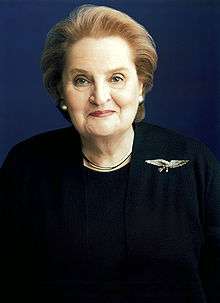
During the initial CD meeting in Warsaw, Madeleine Albright spoke at a parallel meeting of civil society actors called the “World Forum on Democracy,” organized by U.S. based Freedom House and the Stefan Batory Foundation of Poland. Addressing the audience of over 300 NGO representatives, democracy promoters, and civil society leaders from 80 nations, Albright affirmed the need for governments to work together with civil society in support of democracy.
The “Civil Society Pillar” refers to the non-governmental process of the Community of Democracies, including civil society organizations, foundations, and experts devoted to promoting democracy. It is represented by the non-governmental "International Steering Committee" (ISC), which is composed of 27 leaders of civil society organizations from all regions of the world, and the Council for a Community of Democracies, which serves as the ISC’s secretariat. The ISC advises governments on the actions needed to enable civil society to work freely to strengthen democracy, rule of law, and protection for the fundamental rights enshrined in the Warsaw Declaration. The ISC coordinates a variety of initiatives for civil society, including the civil society forum taking place in the biannual Ministerial Conferences of the Community, which results in a set of recommendations to the Ministerial Declaration made by civil society representatives.
Within the framework of the Community of Democracies operates as well a Working Group on Protecting and Enabling Civil Society. The Working Group fosters collaboration among states, civil society and international organizations to counter, through concrete initiatives, the growing global trend towards constraining civil society organizations and restricting the space in which they can operate through legal means.
The Community’s work for civil society has been recognised in a special event for civil society ("Stand for Civil Society") initiated by the U.S. President Barack Obama in September 2013.
Reform
In anticipation of the 10th anniversary of the Community of Democracies, the ministers gathered at the Fifth Ministerial Conference in Lisbon committed their Governments to: “Give a new impetus to the Community of Democracies, strengthen the core principles that presided over its creation, intensify its effectiveness and through action-oriented goals, reaffirm its fundamental role in promoting democratic governance globally”. To that end, the Lithuanian Presidency of the Community of Democracies (CD) established a Working Group on CD Governance Reform, co-chaired by Sweden, to consider proposals for strengthening the effectiveness and efficiency of the CD governance structure in a way that would also generate more commitment and support for the Community of Democracies. Proposals for expanding CD activities are made through a variety of Working Groups and are intended to support democratic actors through technical assistance and exchange of best practices. Governance reforms are intended to facilitate timely consideration and concrete implementation of such proposals.
Governing Council
Before the Governing Council was established, a Convening Group (CG) composed primarily of governments which initiated the Warsaw Conference governed the organization. All decisions were made by consensus. At the Vilnius Ministerial the CD formalized the Convening Group and established the Governing Council. The new Governing Council began with eighteen members and was expanded to include an additional 8 members at the first meeting in September, 2011. Former CG members were grandfathered into the new Governing Council, and all other states which had been invited as participants to the Vilnius Ministerial were invited to express their interest in joining the expanded Governing Council. There is no time limit on membership nor any ceiling on the size of the Council.
In order to be considered for membership on the Council, new member states must respect the principles set forth in the Warsaw Declaration and the Criteria for Participation and Procedures (September 27, 2002), as reported by objective non-governmental reports. In addition, new member states should meet the following criteria and will be evaluated according to consistent standards: 1. Support emerging and transitional democracies and respond to situations involving a serious disruption of democratic governance consistent with the UN Charter and the Warsaw Declaration; 2. Participate in the UN Democracy Caucus in New York and Geneva; 3. Designate a Senior Official of the Foreign Ministry or other relevant government office as the point of contact for the CD; and 4. Make tangible contributions to strengthening the CD through one or more of the following measures: a. Contributing to the budget of the CD (it is recommended but not compulsory that all Governing Council states make a financial contribution, be it large or small, to the CD budget); b. Seconding staff to the Permanent Secretariat; and/or c. Playing an active role in and supporting one or more CD Working Groups and/or CD affiliated bodies such as the Parliamentary Forum and the International Steering Committee of Civil Society.
The Governing Council shall seek consensus but if necessary be able to make decisions by a qualified majority (2/3) of all its members after appropriate debate.
The Governing Council will meet at ministerial level at each of the Ministerial meetings and annually on the margins of the UNGA The Council would also meet from time to time at the call of the Presidency in the capital of the Presidency, in Washington, in Geneva (satellite office), in Warsaw (headquarters of CD Permanent Secretariat), or in other cities as appropriate.
Other pillars and groups
Apart from the governmental dimension and the civil society pillar, the Community includes special pillars and fora to embrace a variety of other stakeholders relevant to the democratic process: a Youth Forum, a Corporate Forum, a Parliamentary Forum, an Academic Advisory Board, and a Women's Forum.
Initiatives
The Community of Democracies wishes to affirm and express its commitment to democratic governance through several action-oriented initiatives:
Working Groups
The Working Groups were to serve as a means for disseminating information and knowledge on best practices, and to come up with practical initiatives to promote and support democracy at all levels – national, regional and international.
The Lithuanian Presidency of the CD (2009-2011), considering the Working Groups as one of the most effective ways to generate collective ideas on advancement of democracy, has launched the following Working Groups:
- CD Governance and Effectiveness (co-chaired by El Salvador and Sweden)
- Education for Democracy (co-chaired by Mongolia and Poland)
- Enabling and Protecting Civil Society (chaired by Canada)]
- Elections (co-chaired by Mexico and the Philippines)
- Promoting Freedom of Opinion and Expression (co-chaired by the USA and Uruguay)
- Women and Democracy (chaired by Lithuania)
Outcomes of the Working Groups (examples)
- Comprising state, civil society and international organization members, the Working Group on Enabling and Protecting Civil Society is a quiet diplomatic initiative aimed at countering the adoption of restrictive laws targeting civil society organizations (CSO) and encouraging the development of more enabling legal environment for CSOs around the world. Past diplomatic initiatives by the WG have in some cases contributed to restrictive draft laws being amended or withdrawn by concerned governments. In addition to its diplomatic work, the WG also engages in international advocacy efforts in support of an enabling civil society environment and provides technical assistance to governments interested in developing an enabling legal environment. Additional information on the WG can be found on the WG on Enabling and Protecting Civil Society's website.
- The WG on Women and Democracy launched the “Women in Democracy” website.
- The WG on Elections has launched the project "Practical Approaches to Support Electoral Processes", a comparative study identifying best practices in the conduction of electoral processes, particularly in the areas of professionalism of EMBs, regulation of political finance, and promotion of equal participation and representation of women and of marginalized groups.
Democracy Partnership
As part of its commitment to support successful transitions to democracy, the Community of Democracies launched the Democracy Partnership (DP) – an initiative meant to encourage reform in countries emerging from authoritarian rule. Encouraging a “race to the top”, the DP is a project aimed only at countries that have showed serious commitment to significant progress towards democracy. They are joined by a group of states, established democracies together with young ones, who together form special Task Forces to support the chosen country.
DP Task Force members include government, civil society organizations and private sector members who work closely during a mandate of two years to help the country in transition to meet its objectives, as defined directly by the government and civil society of the recipient country. Coordinated by the chairing CD Member States, the DP Task Forces have a series of functions:
- They operate as a clearing-house for proposals and projects made and implemented within the DPC initiative.
- They help to find donors and implementing agencies, especially for local non-governmental organizations.
- They observe and support the implementation of the projects as necessary.
- They report to the Community’s Presidency and Governing Council on progress within the recipient country.
Moldova and Tunisia are the first two countries to receive CD assistance through the Democracy Partnership. The Task Force for Moldova is co-chaired by Poland and the United States of America. The Task Force for Tunisia is co-chaired by the Netherlands and Slovakia.
LEND Network
The LEND Network (Leaders Engaged in New Democracies) brings together key leaders from the world’s newest democracies with former presidents, prime ministers, and others leaders engaged in past transitions to democracy. Harnessing the expertise of the Club de Madrid, the world’s largest forum of democratically elected former presidents and prime ministers, the Network augments face-to-face meetings with ongoing peer-to-peer exchanges, to facilitate constant exchange of knowledge and experience between the new leaders and the Network’s advisors, with the vision that a global forum for exchanging information and expertise on democratization shall support leaders as they work to build strong, accountable institutions and establish the rule of law.
UN Democracy Caucus
In the original “Warsaw Declaration,” participating governments promised to “collaborate on democracy-related issues in existing international and regional institutions, forming coalitions and caucuses to support resolutions and other international activities aimed at the promotion of democratic governance.”[1]
Supported by many democracy promotion NGOs, a "Campaign for a UN Democracy Caucus" was and continues to be coordinated by the Democracy Coalition Project, Freedom House, and the Transnational Radical Party.[4]
On September 22, 2004, the Community of Democracies met for the first time as a “democracy caucus” in the UN. More than 80 foreign ministers and UN permanent representatives attended. Since then the caucus has functioned under the leadership of the country chairing the Convening Group with a stated purpose to promote a democratic agenda in the UN.
In addition to the UN Democracy Caucus, the Community of Democracies has been cooperating with the UN on a variety of initiatives and projects. Together with the UN Special Rapporteur on the Rights to Freedom of Peaceful Assembly and of Association, Maina Kiai, the Community launched the project "Protecting Civic Space and the Right to Access Resources", a set of regional dialogues led by the Special Rapporter with the participation of local and regional civil society representatives from Eastern Europe, Asia, Africa, Middle East and Northern Africa, and Latin America. The regional dialogues focus on key challenges that civil society organizations face in accessing resources, and will produce recommendations and strategies to be employed in order to overcome these challenges.
Future
A Concert of Democracies has been proposed by various international relations scholars.
A community of minor democracies has also been proposed. [5]
As well as studies on regional, multinational and transatlantic effort to enhance security and defenses in democracy.[6][7]
See also
- Atlantic Union
- Community of Democratic Choice
- Community for Democracy and Human Rights
- Council for a Community of Democracies
- GUAM Organization for Democracy and Economic Development
- United Nations Parliamentary Assembly
References
- 1 2 “Warsaw Declaration: Toward a Community of Democracies”, Toward a Community of Democracies Ministerial Conference, Warsaw, Poland, 2000-06-27.
- ↑ Annan, Kofi (2000-06-27). UN Secretary General Kofi Annan's Closing Remarks to the Ministerial (PDF) (Speech). Warsaw, Poland. Archived from the original on 2007-09-28. Retrieved 2007-05-16.
- ↑ "Democracy and Development" to be the main theme of El Salvador's Presidency of the Community of Democracies
- ↑ Campaign for a UN Democracy Caucus
- ↑ "A Community of Democracies in the Americas - Instilling Substance into a Wondrous Phrase". Canadian Foreign Policy Journal. 2003.
- ↑ "The Community of Democracies - A New Instrument of Transatlantic Efforts to Enhance Democracy Building?". Lithuanian Foreign Policy Review. 2010.
- ↑ Community of Democracies: "The Role of Regional and Multilateral Organizations in the Defense and Promotion of Democracy" : statement.
External links
| Wikimedia Commons has media related to Community of Democracies. |
